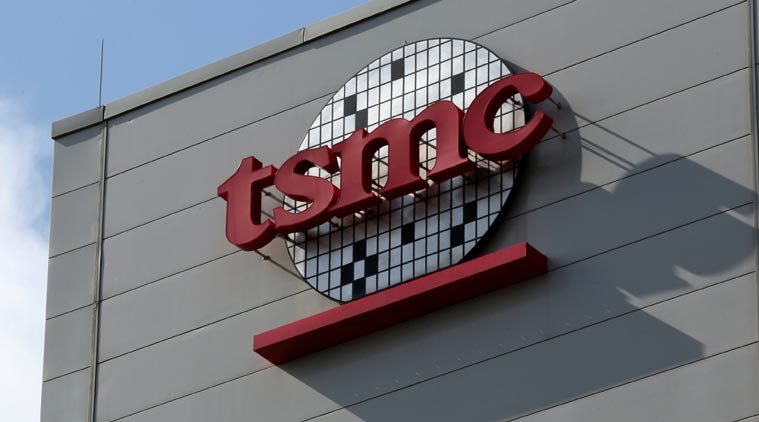In addition to 5G, TSMC’s push is driven by growing demand from tech giants such as Apple and Huawei Technologies Co.
Taiwan Semiconductor Manufacturing Co’s plan to spend as much as $15 billion on technology and capacity in 2019 — roughly 50 per cent higher than originally envisioned — is spurring hopes that the dawn of fifth-generation networks will rev up global chip and smartphone demand.
The primary chip supplier to Apple Inc told investors it’s sharply increasing its estimate for 2019 capital expenditure to between $14 billion to $15 billion from as much as $11 billion previously, and Chief Financial Officer Wendell Huang said 2020 spending will be similar. The Taiwanese company also projected current-quarter revenue ahead of estimates, an affirmation that the latest iPhones have proven a hit with consumers.
Chief Executive Officer C C Wei sketched out hopes that the emergence of 5G, the foundation of future technologies from automated factories and smart homes to blazing-fast consumer electronics, will help underpin its business in coming years. TSMC, which is the world’s largest contract chipmaker, and is seen as a barometer for the tech industry thanks to its heft and place in the supply chain, said the advent of 5G-enabled smartphones will result in more chips in devices than before.
“We are much more optimistic than six months ago,” Wei said, adding that the 5G momentum was larger than the company expected. TSMC has increased its forecast of the 5G smartphone penetration rate in 2020 to a per centage in the mid-teens from its previous single-digit estimate. Many countries, especially larger ones, were rapidly pushing ahead with 5G rollout plans, Wei added.
TSMC’s capital spending plan and outlook prompted price-target hikes from several analysts including at Goldman Sachs and Morgan Stanley. Its shares, which notched a lifetime high just this month, stood largely unchanged Friday in Taipei. More broadly, suppliers including ASML Holding NV, Applied Materials Inc and Tokyo Electron Ltd could stand to benefit from TSMC’s capex increase.
In addition to 5G, TSMC’s push is driven by growing demand from tech giants such as Apple and Huawei Technologies Co, said Roger Sheng, a semiconductor analyst with Gartner. Although the outlook remains uncertain for 2020, the global semiconductor market is set to make a gradual recovery on the back of the demand related to 5G, AI and automotive applications, according to a note from TrendForce on Oct 2.
“Everyone is waiting to see a bounce back of global smartphone market next year after Apple adopts 5G. The self-designed Huawei chipsets will also push demand, as will Qualcomm’s 5nm chips for next year and AMD’s server chip demand,” Sheng said.
Apple and TSMC have scaled new heights in 2019
On Thursday, TSMC also underlined expectations that Apple, its largest customer, is riding a bounce-back in demand for the iPhones after a lukewarm 2018 iteration. Lower prices and aging handsets are helping drive demand for the iPhone 11 range, and Apple is said to be asking its assemblers to target the high end of an original forecast for 70 million to 75 million unit shipments in 2019.
The Taiwanese company foresees revenue of $10.2 billion to $10.3 billion in the pivotal December holiday quarter, surpassing an average projection for about $9.9 billion. TSMC gave that sales outlook after reporting net income of NT$101.1 billion ($3.3 billion) for the September quarter, handily beating estimates as the global chip market recovers.
Still, fallout from ongoing trade conflicts could crimp an industry revival. While TSMC doesn’t factor trade conflicts into its capex plans, any international trade war will have a negative effect on the semiconductor sector, Wei said. China is an especially important market for TSMC and the semiconductor industry, he added.
TSMC and its industry peers had grappled with a plateauing smartphone market, efforts by Apple to move beyond hardware, and US tech-export curbs on No 2 customer Huawei. But investors are growing more confident that the emergence of 5G will prop up chip prices and demand, while the latest iPhones are firing up consumers. TSMC is in fact straining against capacity constraints in the current quarter, Sanford C Bernstein analyst Mark Li said.
The “iPhone is driving stronger near-term demand. We believe the competitive pricing of iPhone 11 is garnering good traction and has prompted Apple to place more orders at the supply chain,” Li said in an Oct 10 note.













![Hotstar Premium Cookies 2019 [*100% Working & Daily Updated*] Hotstar Premium Cookies 2019 [*100% Working & Daily Updated*]](https://tahav.com/wp-content/uploads/2019/11/Hotstar-Premium-Cookies-Free-100x70.jpg)



